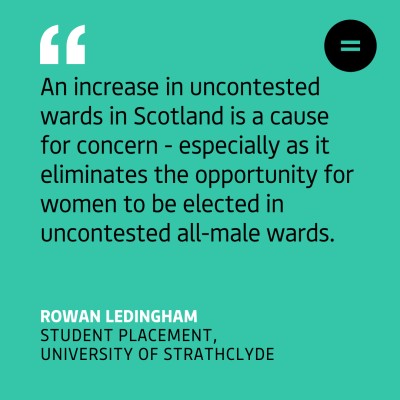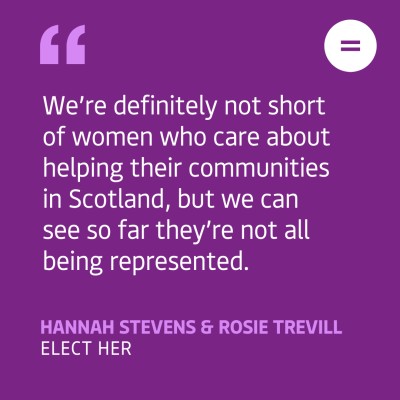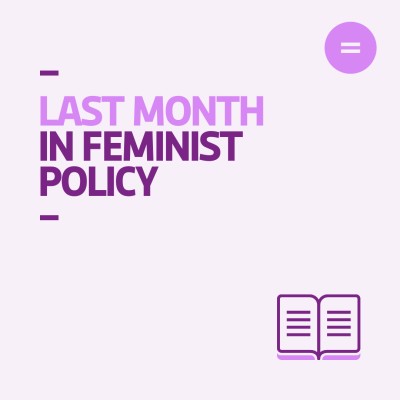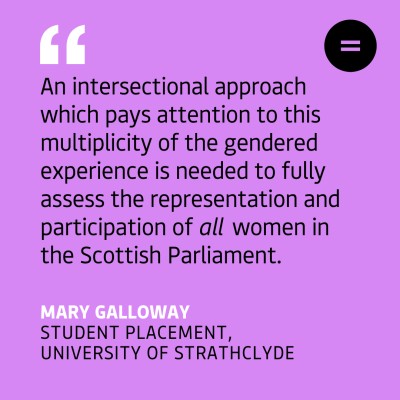Engender blog
All of Engender’s latest news. Reports, reviews, books, articles, and information from across Scotland’s women’s sector.
We would love to hear from other feminists around Scotland. Check out our guidelines for more information on how you can blog for us.
GUEST POST: Which women are visible in the Scottish Parliament?
Today we're publishing the next blog in a series from the current student placements Engender is hosting from the University of Strathclyde Applied Gender Studies and Research Methods course.
Following the local elections last week, it is clear that diverse representation is needed at all levels. Mary Galloway's research focuses on representation in the Scottish Parliament, and for her first post Mary maps out her research into the visibility of women with multiple marginalised identities, as well as discussing gender audits, and why an intersectional approach is needed in order to fully assess the representation and participation of all women in the Scottish Parliament. You can read Mary's second post here and third post here.
In February 2022, it was announced that the Scottish Parliament will undergo a gender audit, something for which Engender, along with other organisations and campaigns, has long advocated. This audit will assess the extent to which women participate in and are represented by the Scottish Parliament, following the guide created by the Inter-Parliamentary Union. While a great start towards a gender-sensitive Parliament, there are clear limitations in what an audit can do to bring an intersectional lens to women’s representation. It is crucial that to truly explore gender equality, we need to uncover the experiences and positions of all women in Holyrood, including those of the most marginalised. The project I am carrying out here aims to provide a snapshot of the representation of the women in Scotland whose lives are structured and limited not just by their gender but by their race, physical and mental abilities, and sexuality too.
Intersectionality is a concept brought forth primarily by Black feminists. It seeks to illuminate the way in which marginalised communities may have their experiences shaped by numerous structures of oppression simultaneously. For example, gendered oppression cannot wholly account for the discrimination faced by a disabled Black woman. Instead, her experience is shaped by racism, sexism and ableism all at once. What this research project seeks to highlight then, is that women with multiple protected characteristics have needs and concerns that are specific to their identity. An intersectional approach which pays attention to this multiplicity of the gendered experience is needed to fully assess the representation and participation of all women in the Scottish Parliament. The gender audit of the Scottish Parliament should proceed with an understanding and utilisation of intersectionality as far as it can within the limitations of auditing an overwhelmingly male, white institution.
Over the course of three blogs, I will delineate the findings of my research into the representation of women in the Scottish Parliament using an intersectional lens to exemplify the value of such an approach. This research has involved using the Scottish Parliament’s website and search tools, looking specifically at the Official Report, Written questions and answers, and Motions in Session 5 (May 2016 - May 2021). These search tools have enabled me to gather data, firstly on how often discussions about women with multiple protected characteristics were being had, secondly on who in Parliament was initiating these conversations, and thirdly on the substantive content of these discussions.
How often are marginalised women talked about?
The frequency of discussions about marginalised women separately from the broad category of ‘women’ provides a good indication of their visibility in the Scottish Parliament. It was found that, in all three areas of parliamentary business, the Official Report, Motions and Written questions and answers (WQAs), mentions of women with multiple protected characteristics were uncommon. Firstly, in the Official Report, search terms that listed a protected group alongside women, such as ‘disabled women’, yielded only 46 relevant results in total. To contextualise this, Session 5 was five years long and had 438 Meetings of the Parliament and 2204 committee meetings. Search terms that included women alongside another protected characteristic brought up only 51 motions out of 2717 (1.9%) in total and only 33 written questions and answers out of 33,334 questions (0.01%) in total. In relative terms, therefore, discussions of women that can be said to have had an intersectional approach in the Scottish Parliament were extremely rare. The presence of some references to women facing multiple discriminations indicates that there is an awareness of their need for focused attention separate from that of women in general. The concerns of multiply marginalised women are evidently being brought to the attention of people in parliament then; however, this has yet to translate into representation proportionate to their vulnerability.
Clearly, women facing multiple discriminations need greater representation in the Scottish Parliament; however, it is useful to look at where they are being discussed at present, who is initiating the conversations and what they are saying. The next blog in this series will do the former, uncovering whose participation in the Scottish Parliament is resulting in the discussion of marginalised women separately from women generally. The third blog will take a focused look at Black and minority ethnic women in order to exemplify the extent to which the specific needs of a community of vulnerable women are understood and represented by the Scottish Parliament.
Why we need data to achieve equal representation in politics
-400.png)
Today we’re publishing the last in a recent series of blogs from the Equal Representation Coalition looking at the state of equality in our politics at the moment, discussing their work in tackling barriers to participation, and exploring the crucial role that accurate data plays in achieving equal representation in our councils and parliaments and why we need more of it.
Here, Engender’s Equal Representation Development Officer Jessie Duncan has a round-up of what key issues we’ve covered in the series and why gathering data is vital to achieving equal representation.
In the run-up to the local elections taking place today, we’ve been publishing blogs from members of the Equal Representation Coalition, which Engender is part of and which brings together organisations from across the equalities sector in Scotland with shared goals around improving access to politics for people from underrepresented groups in order to achieve equal representation in our councils and parliaments They’ve been writing about the pressing need for more diversity within our councils and beyond; their work tackling barriers to participation in politics; and the importance of transparency in representation in order to understand whose voices are being heard – and crucially, whose aren’t.
We know that diversity of representation – that is, representation which actually reflects the communities we live in – leads to richer policy development, more informed decision-making and contributes to a healthy democracy in which people know they are valued. It’s something we should all be striving for.
However, this version of representative democracy is far from our current reality, particularly when it comes to councils.GUEST POST: Women’s Representation in the Scottish Local Council Elections 2022: What We Know So Far

Today we're publishing the next in a series of blogs from the current student placements Engender is hosting from the University of Strathclyde Applied Gender Studies and Research Methods course.
In this post, Rowan analyses women's representation in the upcoming local council elections, and explores issues around uncontested wards, re-standing rates, and press coverage of the elections. You can read Rowan's first blog here.
With the local council elections just around the corner, it is a good time to reflect on what we know so far before people across Scotland head to the polls. As part of my ongoing research and placement with Engender I have analysed a number of areas related to the upcoming elections including candidate selections, re-standing rates among incumbent councillors, and press coverage. This blog will address each of these areas in turn.
GUEST POST: Supporting women to stand for political office

Between now and the local elections on May 5th, we will be publishing a series of blogs from the Equal Representation Coalition. They’ll be taking a look at the state of equality in our politics at the moment, discussing their work in tackle barriers to participation, and will be exploring the crucial role that accurate data plays in achieving equal representation in our councils and parliaments and why we need more of it.
In this post, Hannah Stevens, Chief Executive, and Rosie Trevill, Community and Communications Officer at Elect Her discuss their work supporting women to get involved and stay involved in politics - and why understanding whose voices are missing is essential to creating solutions to women’s underrepresentation in councils and parliaments.
Elect Her is a tiny but mighty organisation that works to motivate, support and equip women in all their diversity to stand for elected office in all spheres of government, providing them with the knowledge, confidence, and skills they need on their journey.  Elect Her is committed to creating safe spaces for women to explore their futures as leaders, legislators, and champions of Scotland’s political governance, nurturing an intersectional community for women in Scotland in the process.
Just 29% of the current cohort of councillors in Scotland are women, although women make up over 50% of the population. It isn't a true democracy until the full breadth of our society is represented in local, devolved and national governments.
Research published last year by the global Institute for Women's Leadership at King's College confirmed that when “women are able to exercise political leadership, there are gains not just for women and girls but for the whole of society.”  It’s in everyone’s interests to ensure that women are being selected and elected in equal numbers to men. We hope we will see an increase in the percentage of women in local government after May’s elections, but stories of many female councillors standing down after just one term sadly does not fill us with hope that the numbers will improve in the substantial way that they need to.
We are currently providing support to 57 women from across Scotland who are preparing to be candidates in the upcoming local elections. We’re supporting women from all political parties, and none, who are committed to having their voices heard in local decision making. We’ve provided campaigning toolkits, skills based workshops, peer support and access to funding opportunities to support these women in the next and vital chapter of their journey into political office. We are cheering them on as they take on this tough challenge and we want to see them thrive through their campaigns and once elected.
But it is hard work. 
We hope that the women elected in May find themselves welcomed into modernised local councils with cultures committed to ensuring women feel able to voice their ideas. There are a number of ways local councils can ensure accessibility and inclusion for all women, including:
- Maintaining a level of virtual access to council meetings;
- Introducing formal parental leave; 
- Introducing work and travel policies that consider caring responsibilities;
- Tackling culture that enables sexist, racist, ableist and homophobic attitudes to persist;
- Creating non-aggressive spaces. 
But we still need more women to be stepping forward for the role whilst that cultural transformation is happening, so of course it is a long-term project. It’s a long-term project worth committing towards however, because when women step forward and encourage these changes, it’ll benefit women for generations to come.
We need reliable and consistent data about who is stepping forward as candidates, not just those elected, so that we can identify - more importantly - who isn't coming forward. We’re definitely not short of women who care about helping their communities in Scotland, but we can see so far they’re not all being represented.
We need a wide range of policies and initiatives from national and devolved governments, local councils, civil society groups like ours and political parties to ensure that the very best people with the widest variety of lived experience see a political future as an appealing and positive way to contribute to their communities. These policies and initiatives can’t be adequately designed until we have a clearer idea about who is missing from our political representation. Data leads to transparency in politics.
From the thousands of conversations that we have facilitated through our live and online workshops, events and training programmes, we hear the voices and needs of women and design our programmes in response to those conversations. We want to provide space for women across Scotland to learn more about their democratic rights, how they can join the conversation and make plans for their own participation. Our programme of support demystifies politics and political processes, so you can find out what a local council actually does, how to join a political party, or how to stand as an MSP.  Our support continues from the very beginning of your journey in understanding what politics is, right through to getting selected and elected; we’ll be right behind you along the way. Our support is a mixture of live online workshops, so you can build a supportive network of women also on their political journey, as well as self-paced online learning resources, so you can fit the work into your busy schedule. What’s more, everything we provide is absolutely free. 
We welcome any woman in Scotland who is interested in exploring their own political future, to join us to learn more about how they can contribute to politics in Scotland. Find out more on our website here.
April 2022 - Policy Round Up

Each month we share a summary of the policy work Engender has been doing . You can find all of our latest briefings and publications here, or in the links below.
Enough is Enough: Tackling Workplace Sexual Harassment in Scotland
In April we launched our new report, Enough is Enough: Tackling Workplace Sexual Harassment in Scotland. The report sets out the extent and nature of sexual and sexist workplace harassment and the impact it has on women in Scotland and highlights the need to reframe this as an issue of women’s equality that is rooted in sexism and sits within the spectrum of violence against women and girls. The report makes recommendations for action on sexual and sexist harassment in the workplace for Scottish Government and other bodies covering: prevention, reporting, investigation and decision-making, employment tribunals, and regulating sexual harassment. You can read the full report online here.
This report is the result of a 2-year project which included convening an expert group of academics, lawyers, violence against women practitioners and employment law specialists, as well as conducting research and focus groups with women who have experienced harassment. This work is part of a wider project in Scotland with Close the Gap, who are working separately to build capacity in employers. The work was funded by Rosa, as part of a 4-nations project on sexual harassment. We had a chance to share this work and talk about recommendations for action in the Scottish Parliament with MSPs and guests including members of the expert group and sector colleagues. We've also shared some quotes about sexual harassment from our survey and focus group sessions which you can see on Twitter here.
What women need from a Scottish Carer's Assistance survey
The Scottish Government are consulting with people in Scotland about a Scottish Carer’s Assistance. A Carer’s Assistance will replace Carer’s Allowance, but it could also do so much more to value and recognise the work done by unpaid carers in Scotland.
Following our recent focus groups with unpaid carers, we've launched a survey to allow you to share your views on the Scottish Government proposals with us, and to help inform Engender's response to the consultation. Women provide more unpaid care and more intensive care than men, and between 60% and 70% of unpaid carers are women. Women are also the majority of carers providing over 35 hours of care per week and women are twice as likely to give up paid work to provide care, rising to four times more likely for ‘sandwich care’.
You can take the survey, which should take around 5-10 minutes to complete, online here. If you have any questions or would like to share your views in a different way, please contact our Head of Development Catriona Kirkpatrick via email at catriona.kirkpatrick@engender.org.uk.
Women's representation in the local elections
Ahead of the Scottish local council elections on 5th May, we're publishing a series of blogs from members of the Equal Representation Coalition exploring the state of equality in our politics at the moment, their work in tackling barriers to participation, and the crucial role that accurate data plays in achieving equal representation in our councils and parliaments and why we need more of it. In this blog, Elena Soper and Rhianna Mallia from YWCA Scotland - The Young Women's Movement look at the importance of ensuring our elected representatives are truly reflective of Scottish society, and their work to empower young women to make their voices heard. Read the blog here.
Following the candidate nomination deadline for the election, a record number of wards have already been declared uncontested. Women5050 have highlighted that of the 18 seats already declared, 78% of these seats have been won by men. It’s concerning but not surprising to see so many uncontested wards these elections. Local politics is still not a viable option for many, including for many women who currently only make up 29% of currently elected local councillors in Scotland. Many elected women councillors are also choosing not to run again, citing issues including the poor remuneration for councillors, online abuse, and difficulties balancing work and family commitments amongst others.
Concerns around Public Sector Equality Duty reform in Scotland
You all know how important we think the Public Sector Equality Duty is, and how much of a difference it could make to gender mainstreaming if done right. Last month, we joined 25 other organisations working for equality and human rights in Scotland, including specialist race, LGBTI and disabled people’s organisations, in calling for a rethink in Scottish Government’s plans for PSED.
The Scottish specific duties of PSED, which is meant to ensure that all public bodies take action to proactively advance equality and eliminate discrimination, has been under review for several years, and we’ve been eagerly awaiting the consultation. Unfortunately though, what is being consulted on reflects very light-touch changes, and a real missed opportunity for substantial reform. In the joint submission, we state that our concerns about the failures of the existing system are not reflected in the current consultation, despite many of us repeatedly raising these with Scottish Government.
You can read more, and access the full submission here, and thanks to CRER for their work in coordinating the submission. We’ll also be producing our own response to the submission in the next few weeks, which we’ll share with you.
Gender bias in political news reporting during the Covid-19 pandemic
Recently, we published the next in a series of blogs from the current student placements Engender is hosting from the University of Strathclyde Applied Gender Studies and Research Methods course. In this blog, Kirsty Rorrison discusses the COVID-19 pandemic, from it's impact on women and minoritised communities to it's representation in the media, and introduces research specifically focusing on how gender bias in political news reporting has operated during the pandemic. Read the blog post here.
Be sure to check out the previous post in this series from Rowan Ledingham, who discusses women's representation in local councils, and will be researching about why some women that were previously elected are not re-standing in the local council elections in May 2022. Read it here.
Countdown to the local council elections on 5th May
It's now less than a week until the local council elections that are taking place next Thursday 5th May. Elected councillors will represent you on your local council, and local councils are responsible for making decisions about how money is spent to provide local public services. For this election you vote using numbers, and your ballot paper will list all the candidates standing to be councillors in your ward. You will be asked to number the candidates in order of your choice using 1, 2, 3 and so on, but you don’t have to number every candidate. You can find out more about the election and how to vote, in this guide from the The Electoral Commission.
In the lead up, we've been publishing a series of blogs from Equal Representation Coalition members, who have been taking a look at the state of equality in our politics at the moment, discussing their work in tackle barriers to participation, and exploring the crucial role that accurate data plays in achieving equal representation in our councils and parliaments and why we need more of it. Last week we published a post from Junaid Ashraf, Community Engagement Officer at CEMVO Scotland, who explores some of the barriers faced by ethnic minority people entering politics, how these contribute to persistent underrepresentation in our councils and parliaments, and why it’s high time for change. Read the latest blog here, as well as previous posts from YWCA Scotland - The Young Women's Movement here, and from our Equal Representation Development Officer, Jessie Duncan, here.
Elect Her have also been sharing some ways to help get your chosen local candidate elected such as canvassing, and leafleting, and phone banking. You can find more information on their website about how to get involved, as well as which candidates are standing in your local area, here.
Downloads
 Engender Briefing: Pension Credit Entitlement Changes
From 15 May 2019, new changes will be introduced which will require couples where one partner has reached state pension age and one has not (‘mixed age couples’) to claim universal credit (UC) instead of Pension Credit.
Engender Briefing: Pension Credit Entitlement Changes
From 15 May 2019, new changes will be introduced which will require couples where one partner has reached state pension age and one has not (‘mixed age couples’) to claim universal credit (UC) instead of Pension Credit.
 Engender Parliamentary Briefing: Condemnation of Misogyny, Racism, Harassment and Sexism
Engender welcomes this Scottish Parliament Debate on Condemnation of Misogyny, Racism, Harassment and Sexism and the opportunity to raise awareness of the ways in which women in Scotland’s inequality contributes to gender-based violence.
Engender Parliamentary Briefing: Condemnation of Misogyny, Racism, Harassment and Sexism
Engender welcomes this Scottish Parliament Debate on Condemnation of Misogyny, Racism, Harassment and Sexism and the opportunity to raise awareness of the ways in which women in Scotland’s inequality contributes to gender-based violence.
 Gender Matters in Social Security: Individual Payments of Universal Credit
A paper calling on the Scottish Government to automatically split payments of Universal Credit between couples, once this power is devolved to the Scottish Parliament.
Gender Matters in Social Security: Individual Payments of Universal Credit
A paper calling on the Scottish Government to automatically split payments of Universal Credit between couples, once this power is devolved to the Scottish Parliament.
 Gender Matters Manifesto: Twenty for 2016
This manifesto sets out measures that, with political will, can be taken over the next parliamentary term in pursuit of these goals.
Gender Matters Manifesto: Twenty for 2016
This manifesto sets out measures that, with political will, can be taken over the next parliamentary term in pursuit of these goals.
 Scottish NGO Briefing for UN Special Rapporteur on Violence Against Women
Joint briefing paper for the UN Rapporteur on Violence Against Women.
Scottish NGO Briefing for UN Special Rapporteur on Violence Against Women
Joint briefing paper for the UN Rapporteur on Violence Against Women.

Newsletter
Sign up to receive our newsletter here:
Sign up to our mailing list
Receive key feminist updates direct to your inbox:
